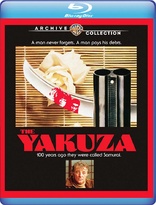The Yakuza Blu-ray Movie
HomeThe Yakuza Blu-ray Movie 
Warner Archive CollectionWarner Bros. | 1974 | 112 min | Rated R | Feb 14, 2017
Movie rating
7.1 | / 10 |
Blu-ray rating
| Users | 4.5 | |
| Reviewer | 3.5 | |
| Overall | 3.5 |
Overview
The Yakuza (1974)
Stationed in Japan during World War II, a retired American detective returns twenty years later on a mission for friend -- and his past is waiting for him.
Starring: Robert Mitchum, Ken Takakura, Brian Keith, Herb Edelman, Richard JordanDirector: Sydney Pollack
| Drama | Uncertain |
| Crime | Uncertain |
| Thriller | Uncertain |
| Action | Uncertain |
Specifications
Video
Video codec: MPEG-4 AVC
Video resolution: 1080p
Aspect ratio: 2.40:1
Original aspect ratio: 2.39:1
Audio
English: DTS-HD Master Audio 2.0 Mono (48kHz, 24-bit)
Subtitles
English SDH
Discs
Blu-ray Disc
Single disc (1 BD)
Playback
Region free
Review
Rating summary
| Movie | 3.0 | |
| Video | 5.0 | |
| Audio | 4.0 | |
| Extras | 3.0 | |
| Overall | 3.5 |
The Yakuza Blu-ray Movie Review
Honor Is Due
Reviewed by Michael Reuben February 15, 2017Director Sydney Pollack made The Yakuza in between a bittersweet romance, The Way We Were
(1973), and a paranoid spy thriller, 3 Days of the
Condor (1975), both of which were box office
hits that have become classics of their respective genres. But The Yakuza was not similarly
successful. Based on a script by Paul Schrader (Taxi
Driver) and his brother, Leonard, both of
whom had lived in Japan and whose fascination with Japanese culture would reach full
expression ten years later in Mishima: A Life in Four
Chapters, The Yakuza invited American
audiences to experience a world that, in 1974, remained an unfamiliar mystery—at least to
anyone without ready access to arthouse cinemas showing samurai films and Japanese gangster
movies. Pollack was brought onto the project at the behest of star Robert Mitchum, and he seems
to have relished the opportunity to explore alien territory. The result was an uneasy mix of film
noir and cultural travelogue that was poorly received by both U.S. critics and audiences (though
the international reaction was more favorable).
The following decade would see a surge of international interest in all things Nipponese, fueled
by Japan's expansion into the global economy and also by a home video revolution that allowed
a wider audience to sample Japanese cinema. By the time novelist Michael Crichton published
Rising Sun in 1992 (with Philip Kaufman's film
adaptation the following year), eruptions of
Japanese tradition into American popular culture were no longer a novelty.
The Yakuza remains something of a cinematic curiosity. Cited for extreme violence at the time of
its release, the film's bloodletting and body count have long since been surpassed by numerous
orgies of gory excess from both East and West. Fifteen years after Pollack's film, even the
wince-inducing ceremony of yubitsume, or self-mutilation as an act of apology, could be
incorporated as a plot point into Ridley Scott's Black Rain
without further explanation. From the
vantage point of today, Pollack's exploration of honor and giri (or "obligation") seems almost
quaint, like the enthusiasm of a tourist recently returned from discovering an exotic new
destination. Still, while Pollack may be one of the least appreciated of Seventies filmmakers, in
large part because he continued to work within what remained of the studio system instead of
joining the crowd of mavericks and rebels for which the decade is famous, The Yakuza serves as
a reminder that Pollack, too, had an adventurous streak. For all the film's flaws, this superb new
presentation from the Warner Archive Collection is a welcome addition to the director's filmography
on Blu-ray.
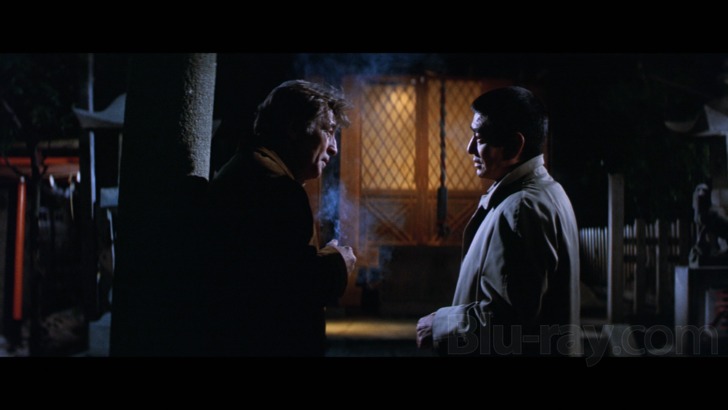
Pollack hired screenwriter Robert Towne (Chinatown) to revise the Schraders' script, but even Towne was unable to harmonize The Yakuza's conflicting elements. The film introduces itself in the classic form of a hardboiled detective story, where someone in trouble—here, a successful importer/exporter named George Tanner (Brian Keith)—hires a private investigator to disentangle him from shady dealings. The catch is that this particular detective, Harry Kilmer (Robert Mitchum), is a former war buddy who, along with Tanner, spent several years after World War II policing Japan as part of the occupying American force. Since then, Tanner has done business with a Japanese gangster boss, or oyabun, named Tono (Eiji Okada), but a dispute has arisen over a missing shipment of guns, and Tono is threatening violence. In The Yakuza's opening, one of Tono's henchmen delivers a message to Tanner in the form of a piece of cloth, the full significance of which is not explained until almost half an hour later.
Tanner's predicament is such an obvious pretext for The Yakuza's real story that it barely gets serious attention. Indeed, the fact that Tono has kidnapped Tanner's daughter for leverage is mentioned almost in passing, and Tanner behaves so calmly and so unlike a parent whose child is being threatened with dismemberment that the kidnapping plot feels like an afterthought. The film's true focus is the reckoning with Kilmer's past in Japan, which is a thicket of conflict and heartache. During the occupation twenty years ago, Kilmer saved the life of a woman, Eiko (Keiko Kishi), with whom he fell in love but who refused to marry him. Eiko's brother, Tanaka Ken (Takakura Ken), is a former Japanese soldier who despises Kilmer as his enemy but owes him a debt of honor for saving his sister's life. Now Tanner wants Kilmer to call in that debt to obtain Tanaka's aid, because Tanaka is himself a former yakuza with the knowledge and connections to navigate Japan's underworld. To reach Tanaka, however, Kilmer must reconnect with Eiko in Tokyo, where she runs a bar with her daughter, Hanako (Christina Kokubo). In a sign of Eiko's continued attachment to the American who still loves her, the bar is named "Kilmer House".
An additional player in these events is Goro, the brother of Tanaka and Eiko (James Shigeta, who will be familiar to Die Hard fans as Takagi, the unfortunate Nakatomi executive). Now a respected yakuza counselor, Goro must delicately maneuver between his conflicting loyalties to his gangster colleagues and his family. In agreeing to help Kilmer, Goro asks only one thing: If Kilmer should come upon a young yakuza with a spider tattoo on his head, please spare his life. He is Goro's estranged son.
Explicating these overlapping relationships is a big enough task for a single film (and even more so after buried secrets are unearthed), but The Yakuza labors under the additional burden of having to introduce its audience to the rituals and codes of Japanese gangster life. A key device is the character of Dusty (Richard Jordan), a young enforcer in Tanner's organization who accompanies Kilmer to Japan as his bodyguard. Surveying this brave new world with interest and wonder, Dusty asks questions and provokes explanations, sometimes from Kilmer, sometimes from their Tokyo host, Wheat (Herb Edelman), who served with Tanner and Kilmer during the war, and even from Eiko's daughter, Hanako. (She's the one who explains to Dusty why so many gangsters are missing their little finger, courtesy of ritual yubitsume.) The Yakuza is at its best when the onus of exposition recedes so that the camera can linger on the expressive faces of Mitchum and Takakura, both of whom have the gift of conveying more in silence than most actors are able to manage with words. The film has several elaborately choreographed sequences of bloody combat, and they're well done, but anyone watching The Yakuza for its fight scenes is likely to be disappointed. Its heart lies with the exploration of honor, obligation and atonement, which are subjects best explored in moments of quiet reflection.
(A note about the film's running time: WAC's Blu-ray contains the U.S. theatrical version of The Yakuza, which runs 112 minutes and is Pollack's final cut. However, the film was released in Japan first, and for that market alone, an additional three scenes were included depicting rituals familiar to a Japanese audience but deemed unnecessary (and potentially confusing) for the rest of the world. The additional scenes added approximately ten minutes to the running time, and I have been advised by WAC that they were originally slated for inclusion as a Blu-ray extra. However, after a review of the archives, no source material could be located. Any suggestion that the film has been cut for video is erroneous.)
The Yakuza Blu-ray Movie, Video Quality 
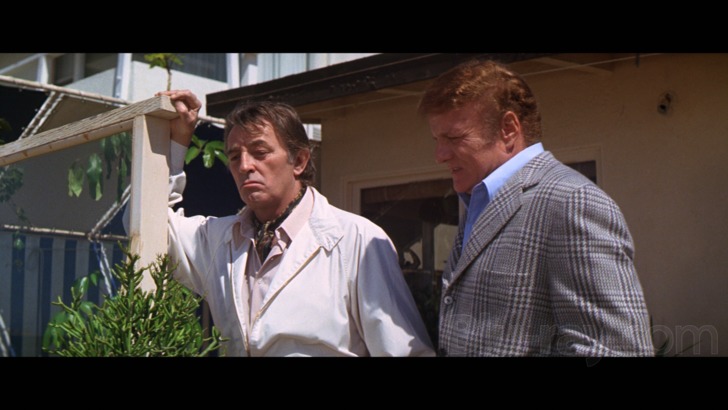
The Yakuza was shot by Japanese cinematographer Kôzô Okazaki, except for the opening scenes
in America, for which Pollack called on Duke Callaghan, his DP from Jeremiah Johnson. As
Pollack describes in his commentary, he and Okazaki communicated with an improvised system
using grayscale cards, since neither spoke the other's language. Their signing must have been
effective, because The Yakuza is beautifully lit and elegantly shot, striking an effective balance
between the visual worlds of the two cultures juxtaposed by the screenplay.
For this 1080p, AVC-encoded Blu-ray, the Warner Archive Collection has commissioned a new
scan of an archival interpositive, which was performed (at 2K) by Warner's Motion Picture
Imaging facility, followed by extensive color-correction and cleanup. The Blu-ray image is
astonishing: a shining example of the video quality that can be extracted from a well-preserved
Seventies film source. Detail and sharpness are exceptional, revealing every weary crag on the
face of Robert Mitchum's Kilmer, the tiniest flickers of expression in the stony countenance of
Takakura Ken's Tanaka and subtle textures in clothing and sets—and also giving full due to the
intricate and colorful tattoos with which the yakuza decorate their bodies (according to Pollack's
commentary, applying them to the cast was a major daily project).
Nighttime blacks are deep and solid; densities are consistently stable; and the palette alternates
between subdued earth tones, which convey the deceptively serene surface of a neatly ordered
society, and richly saturated reds and blues, which reflect the luxury and allure of the criminal
underworld. The film's grain pattern is natural and finely resolved. WAC has mastered The
Yakuza at its usual high average bitrate (here, 34.98 Mbps), with a superior encode.
The Yakuza Blu-ray Movie, Audio Quality 
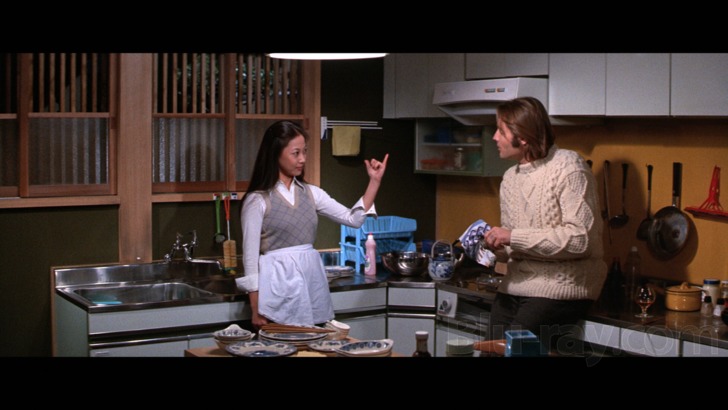
The Yakuza's mono sound mix has been taken from the original magnetic print master tracks and encoded in lossless DTS-HD MA 2.0. The English dialogue is clearly rendered, and the Japanese dialogue is subtitled. The track has respectable dynamic range that aptly serves sequences of violent confrontation and adequately conveys such distinctive environments as a sumptuous bathhouse or a pachinko palace. The score is by Dave Grusin, in the first of his many collaborations with Pollack, and it ably combines familiar thriller elements with Japanese instruments and intonations.
The Yakuza Blu-ray Movie, Special Features and Extras 
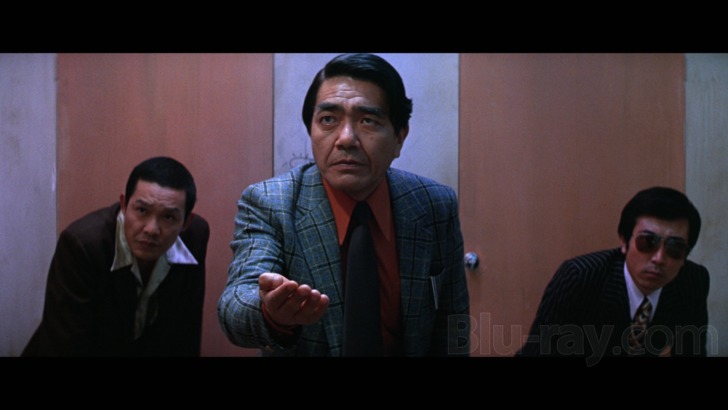
The extras have been ported over from Warner's 2007 DVD release of The Yakuza, with the
addition of the trailer.
- Commentary with Director Sydney Pollack: This commentary was recorded for DVD after Pollack finished The Interpreter (2005), which turned out to be his last film. Although he hadn't watched The Yakuza in years, Pollack displays impressively detailed recall of shooting the film, especially his work with Mitchum and Takakura, with DP Okazaki and with production designer Stephen B. Grimes. Pollack's enthusiasm for the cultural themes explored in the film is evident throughout. The commentary has occasional periods of silence but is otherwise a consistently engaging experience.
- Vintage Featurette: Promises to Keep (1080p; 1.33:1; 19:29): This archival featurette bears little resemblance to today's promotional EPKs. Extensive footage is included from multiple shooting locations, as well as clips of Pollack being interviewed. Although the short has been remastered in 1080p, the quality is limited by the source.
- Theatrical Trailer (1080p; 2.40:1; 3:01): The struggle by Warner's PR department to find a marketing angle is readily apparent in this selection of excerpts with minimal narration.
The Yakuza Blu-ray Movie, Overall Score and Recommendation 
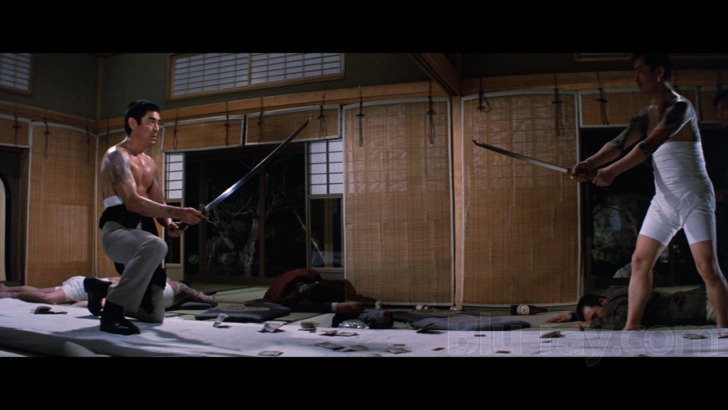
I'm not as much a fan of The Yakuza as my colleague Josh Katz, but I
can appreciate the
performances and the cinematic craftsmanship, even as the script's shortcomings become more
apparent with each viewing. Every Sydney Pollack film has something worthwhile, and The
Yakuza is no exception. WAC's Blu-ray presentation is superb and, with due warning that the
film isn't for everyone, recommended.
Similar titles
Similar titles you might also like

Outrage
アウトレイジ / Way of the Yakuza
2010

Drunken Angel
醉いどれ天使 / Yoidore tenshi
1948

Branded to Kill
殺しの烙印 / Koroshi no rakuin
1967

Ghost Dog: The Way of the Samurai
1999

Tokyo Drifter
東京流れ者 / Tôkyô nagaremono
1966

Why Don't You Play in Hell?
Jigoku de naze warui
2013

Suburra
2015

The Friends of Eddie Coyle
1973

Yojimbo
用心棒 / Yôjinbô
1961

Dragnet Girl
非常線の女
1933

Point Blank
1967

Drug War
毒戰
2012

Gloria
1980

High and Low 4K
天国と地獄 / Tengoku to jigoku
1963

Black Rain
1989

Hana-Bi
Fireworks / はなび
1997

Infernal Affairs III
無間道III:終極無間
2003

Floating Weeds
浮草
1959

Bullet Ballet
バレット・バレエ
1998

Ley Lines
1999
